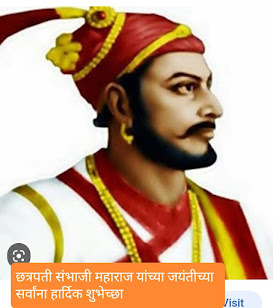Let's read this article about Sambhaji Maharaj: The Extraordinary Life of a Warrior King
Introduction:
The annals of history are adorned with tales of valiant warriors, noble leaders, and individuals who leave an indelible mark on the world. Among them stands a figure whose life story epitomizes courage, resilience, and sacrifice. This blog post is dedicated to the remarkable life of Sambhaji Maharaj, the second Chhatrapati of the Maratha Empire, and his enduring legacy.
Sambhaji Maharaj Early Life and Royal Lineage:
Born on May 14, 1657, in the prestigious Bhosale family, Sambhaji was the eldest son of the legendary Maratha king, Chhatrapati Shivaji Maharaj. From an early age, Sambhaji was exposed to the art of warfare, diplomacy, and statecraft, which molded him into a future leader. He imbibed the virtues of his father, who instilled in him a sense of duty, honor, and love for his people.
Warrior Training and Skills:
Sambhaji's upbringing was characterized by rigorous training in martial arts, horsemanship, and military strategy. Under the tutelage of skilled instructors, he honed his skills, transforming into a formidable warrior. His thirst for knowledge extended beyond warfare, as he studied various subjects like literature, history, and administration, enhancing his intellectual prowess.
Challenges and Trials:
The period following Shivaji Maharaj's death posed immense challenges for Sambhaji. The Mughal Empire, under the rule of Emperor Aurangzeb, sought to crush the burgeoning Maratha power. Sambhaji, faced with treachery from within and hostility from external forces, rose to the occasion with indomitable courage. Despite numerous setbacks, he fought valiantly to protect his father's legacy and preserve the sovereignty of the Maratha Empire.
Leadership and Governance:
In 1680, Sambhaji ascended to the throne as the Chhatrapati, inheriting a kingdom in turmoil. Despite inheriting a war-ravaged state, he displayed remarkable leadership skills, revitalizing the Maratha administration, and implementing progressive policies. Sambhaji was an ardent patron of the arts and literature, encouraging scholars, poets, and artists to flourish under his reign. His reign witnessed the construction of forts, temples, and infrastructure projects, symbolizing his commitment to the prosperity of his people.
Military Campaigns and Diplomacy:
Sambhaji's military prowess and strategic acumen were evident in his numerous campaigns against the Mughal Empire. He inflicted heavy losses upon the Mughal forces and expanded Maratha territories, posing a formidable challenge to Aurangzeb. Sambhaji's skillful diplomacy, including alliances with regional powers, further bolstered the Maratha Empire's position, ensuring its survival amidst a hostile environment.
Legacy and Sacrifice:
Sambhaji Maharaj's life was tragically cut short in 1689 when he was captured by Aurangzeb's forces. Despite enduring excruciating torture, he refused to renounce his faith and embrace Islam, displaying unwavering loyalty and bravery until his last breath. Sambhaji's sacrifice and unwavering spirit became a rallying cry for future generations, inspiring the Maratha warriors to continue the struggle for independence.
Conclusion:
Sambhaji Maharaj's life story exemplifies the virtues of resilience, courage, and sacrifice. From his early days as a prince to his reign as the Chhatrapati, Sambhaji's unwavering dedication to his people and his homeland established him as an icon of Maratha valor. His legacy endures as a beacon of inspiration.



.jpeg)


